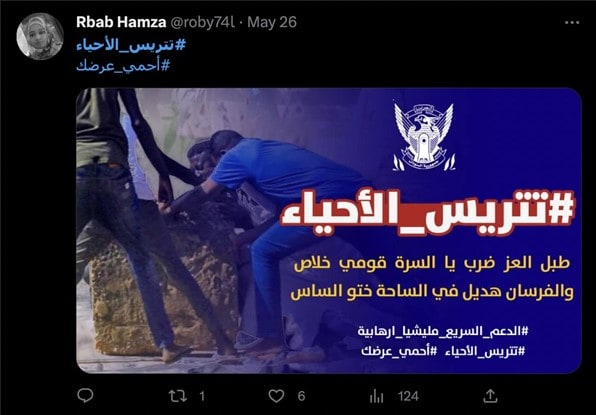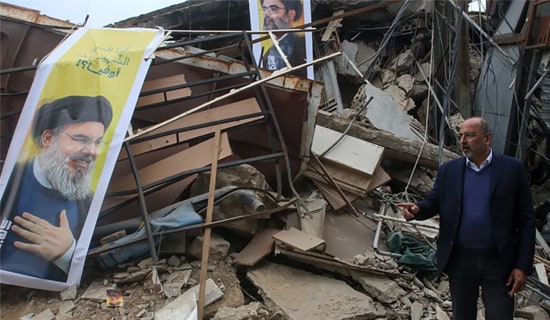All wars feature their own narratives. These are the ways that belligerents seek to portray themselves to outsiders and to themselves. The brutal civil war between two armed factions that erupted in Sudan on April 15, 2023 is no different.

Pro-RSF TikTok account mocking SAF claims of control over Khartoum
The war is between two generals and two armed institutions with their own history and ethnic/geographic base. On the one hand, you have Sudan's traditional army, the Sudan Armed Forces or SAF, which has directly or indirectly ruled Sudan for most of its history since independence and whose leadership is often drawn from the same region in Northern Sudan. All of Sudan's dictators have been army generals and overthrew short-lived civilian or democratic governments (the dictator Nimeiry was in turn overthrown in 1985 by his own military, as was Al-Bashir in 2019).
Since Sudan has been at war for most of its history, SAF has always loomed large. It has benefited from its hegemony to create its own parallel economy, including commercial enterprises and even the country's largest bank while consuming large percentages of the country's budget. One might say that SAF has been a participant in the looting of the state and the country for most of its existence.

Former Sudan dictator Omar Al-Bashir; behind him are two members of the current ruling military council.
Opposing SAF's Kleptocracy, Inc. is essentially a bandit army, the so-called Rapid Support Forces (RSF) which grew out of Darfur Arab militia auxiliaries providing cannon fodder for SAF's counterinsurgency campaigns. These rough militias, the Janjaweed, which were a type of bandit or highwayman, were themselves an outgrowth of still earlier militias used by Khartoum to fight the mostly South Sudanese rebels of the Sudan Peoples' Liberation Army (SPLA).
SAF has ruled Sudan for most of the country's history, but couldn't win its wars by itself. It needed help on the desert and scrub battlefields of the country's far-flung corners. This help, in the form of auxiliary or paramilitary forces called Murahileen, or Popular Defense Forces, or Janjaweed, or Border Guard units, or RSF, always had an institutional ethos involving looting and mayhem when they were unleashed against ethnic populations deemed sympathetic to rebel groups. If the army had decades of experience in looting the state, RSF's looting occurred – until recently – in the rural regions, looting civilians rather than the coffers of the state in distant Khartoum.
And while SAF had its decades-long business empire centered in Khartoum, RSF commander Muhammad Hamdan Dagalo, "Hemedti," was only in the past decade able to seize the gold mines of Darfur and elsewhere as a way to finance himself and advance RSF's interests.
Since the war began on April 15, both sides have put out official communiques and statements that are actually more similar than different. Both claim to speak for the Sudanese people, promise a return to democracy and a commitment to agreements with the international community. Both sides even congratulated Turkey's strongman Recep Tayyip Erdogan on his recent electoral victory. Of course, both demonize the other, both blame each other for human rights violations and violations of ceasefires and humanitarian truces. This is them speaking in the language of the international community in order to gain support or sympathy.
While both SAF and RSF tend to sound alike in official propaganda, the messages they tell their supporters and the content aimed for local consumption are somewhat different.
SAF has wrapped itself in the national flag, in the alleged institutionalism of the armed forces. More than one supporter has written on social media that "the army is the state." Another wrote that "we are with the army even if it rules for one thousand years."[1] The language here is similar to that seen in military dictatorships elsewhere, where the army is portrayed as embodying the best virtues of the nation and serving as the ultimate guardian of the state. This has been the rhetoric seen in neighboring Egypt, and was used by Sudan's interim head of state, SAF General Abdel Fattah Al-Burhan, in speeches even before the current conflict. In these remarks he sought to place the army as above and apart from the government, any future civilian government.
Pro-army partisans, including uniformed officers, have not been shy from appearing in the media and regurgitating arrogant and xenophobic rhetoric very much in sync with the Islamist Al-Bashir regime (Bashir regime elements referred to in Arabic as "Al-Kizan"). Prominent former regime officials have been outspoken in their support of SAF in the conflict with the RSF.[2] Even before actually winning, army sources have also openly threatened civilians and politicians they see as either collaborators with RSF or insufficiently "patriotic" or critical of military rule.[3] Since the army is the embodiment of the nation, to be against the army is to be a traitor.

Janjaweed poets reciting on TikTok
Rhetoric from the boosters of RSF is even more interesting. On TikTok and Twitter, using images, poetry, music, and memes, they have embraced a narrative combining both the language of the downtrodden and the oppressed with rhetoric extolling the superiority of certain tribal peoples, their martial virtues, and their tribal traditions over others.[4] Here the peoples who make up RSF are "knights" or horsemen embodying noble Arab characteristics, while Hemedti is their Emir. As one RSF supporter told me directly on Twitter, "Sudan is the land of the knights rather than the land of Al-Kizan" (ard al-fursan wa leisa ard al-kizan).[5]

RSF Commander Hemedti as a princely knight on TikTok
These "knights" are identified specifically as belonging to ethnic groups that make up the RSF or share characteristics similar to them. This means Darfur's Rizeigat confederation of Arab tribes, either camel herders (abbala) or cattle herders (baggara) found on both sides of the Chad-Sudan border. The core of RSF came from the camel-herding Rizeigat, from where comes its leadership in the Dagalo brothers.
This knightly class also includes non-Sudanese Arabs and non-Arab tribes that live in similar ways, the Toubou and Goran found in Chad and the Zaghawa of both Chad and Darfur. RSF here channels echoes of the rhetoric promoted by Libya's Qaddafi in his 70s-90s wars in Chad and the Sahel (and inside Sudan) which embraced these nomadic tribes of traditional raiders as having particularly "Arab" virtues, even when these tribes were not, strictly speaking Arabs.[6] Researcher Daniel van Oudenaren, who has followed informal RSF media closely, has noted that even the once pejorative term "Janjaweed" has been repurposed as a term of pride on social media.[7]
RSF rhetoric also relies heavily on demonizing SAF as catspaws of Sudan's Islamist movement. The fact that Sudan's Islamists really do seem to be supporting SAF makes this job all the easier.[8] And some observers have noted that RSF supporters have expanded the category of Al-Kizan supporters to include anyone who opposes them in Khartoum and the Nile Valley and who may have wealth.

SAF talking head spouting Islamist propaganda, also on TikTok
Here the language of resentment of the poor against the rich comes into play. Hemedti may be a gold mine-owning nouveau riche millionaire, but certainly his followers are not, and there is no doubt that the city of Khartoum was relatively "richer" than the poverty stricken and jobless communities of Sudan's peripheries. It is in the capital that ruthless criminality and the language of payback for the crimes of the center against the periphery combine. It is as if RSF is occupying and pillaging an enemy capital rather than the main city of their own country.
This is not so new. When I first met Darfur Arab tribal leaders and Janjaweed commanders in 2008, they were always quick to point out that they were poor, that their communities were drought-stricken with high levels of unemployment and illiteracy, and that even though they were gunmen for hire in the pay of Khartoum, Khartoum provided little to them in terms of social services or public works. These were victimizers who saw themselves as victims of the system.
RSF's rhetoric pits the Desert against the Sown, combining an appeal to "knightly raiders" across the Sahel, beyond the borders of Sudan, to come and fight for a fantasy of the old tribal virtues coupled with the possibility of adventure and loot. This is a potent mix across a region with many poor young men, often oppressed or marginalized, with nothing to do. For them, Hemedti's rise is an inspiring success story, he "represents a legendary figure for the persecuted Arab tribes from Darfur to Mali."[9]
The strands of rhetoric used by both sides are incendiary, and the longer the war continues the more likely it will descend into even deeper levels of savagery and inhumanity. One side sees itself as above civilian rule and embodying the state where it can do no wrong, while cozying up to the partisans of Islamist totalitarian rule. The other embraces a narrative of tribal supremacy combined with the resentment and revenge of a heavily-armed underclass given a license to steal.
SAF's call of "One Army One People"[10] seeks to identify itself with the Sudanese people while placing that "other army," RSF, beyond the pale (in Cairo, the motto was "the Egyptian people and the Egyptian army are one hand").[11] Not surprisingly, SAF has also sought to manipulate the well-founded fears of the people of Khartoum in the face of RSF's utter rapaciousness. SAF banners on social media have called for neighborhoods to defend themselves from the RSF "terrorist militia" by putting up barriers.

SAF digital banner calling on Khartoum civilians to build barriers against RSF
Most Sudanese would certainly prefer another choice, but many, especially those desperate in Khartoum, will lean towards the potential totalitarian rule of SAF over the chaotic reign of RSF's bandit army and its raider ideology. Better that the state be robbed than for your home to be invaded and your personal goods taken. With tyranny or chaos as the principle options, many will resign themselves to the devil they know instead of the devil on horseback.
*Alberto M. Fernandez is Vice President of MEMRI.
[1] Twitter.com/joba_mohammed/status/1663290603906510849, May 29, 2023.
[2] Youtube.com/watch?v=1Xer8NnAmug&t=4s, April 25, 2023.
[3] Youtube.com/watch?v=smjrxgi—ao, May 24, 2023.
[4] Twitter.com/daniel_van0/status/1659048474317320193, May 24, 2023.
[5] Twitter.com/Ibrahimalganimi/status/1662833040320544769, May 17, 2023.
[6] Africanarguments.org/2008/05/land-and-power-the-case-of-the-zaghawa, May 28, 2008.
[7] Twitter.com/daniel_van0/status/1662221410243334144, May 26, 2023.
[8] Youtube.com/watch?v=WOqWKkjlnYo, May 27, 2023.
[9] Twitter.com/seid22Abkar/status/1654270847996010499, May 4, 2023.
[10] Youtube.com/watch?v=ZFwVupoZOfQ, May 19, 2023.
[11] Almasryalyoum.com/news/details/204784, December 3, 2011.





